Longtime Scarsdale Resident and Community Volunteer Lucas Meyer Passes Away
- Details
- Written by Joanne Wallenstein
- Hits: 2594
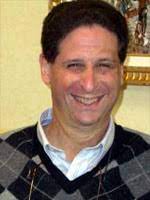 Lucas Jason Meyer, 64, of Scarsdale, New York, died of complications due to Alzheimer's Disease in White Plains on March 12, 2024.
Lucas Jason Meyer, 64, of Scarsdale, New York, died of complications due to Alzheimer's Disease in White Plains on March 12, 2024.
He was born in New York in 1959 to Miriam Weiss Meyer, and had a fascination with cars at an early age. Lucas attended Sleepy Hollow High School before studying history at Colgate University. An avid lover of American and international history, he spent his semester abroad in London wherein he further fell in love with the country.
Lucas was also fluent in Spanish, which he attributed to his favorite Spanish teacher in high school. Upon graduation, he went to work for Republic National Bank for the next twenty plus years. In 1986, he was transferred to Buenos Aires, Argentina to run a division where he met his wife. In 1990, the two moved back to the States to New York where they subsequently spent the next thirty-four years and raised three children.
Upon leaving Republic, Lucas and two business partners decided to strike out on their own and form Fifth Street Advisors. Lucas acted as a fiduciary and served clients all across the tristate area, all of whom spoke to his warmth and candor as an advisor.
Lucas was also a deeply charitable person who was dedicated to preserving the history of the town he lived in. In 2003, he 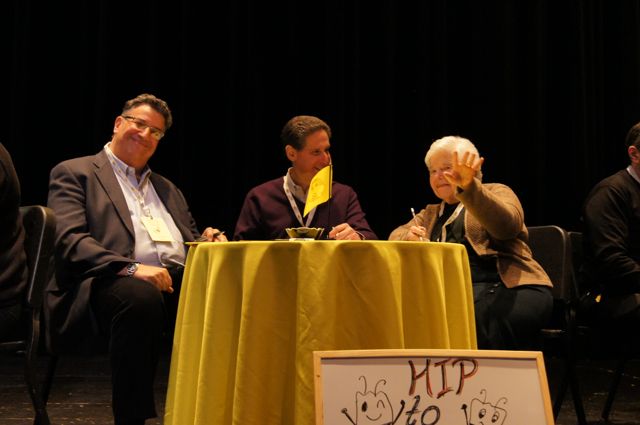 Bob Berg, Lucas Meyer and Esther Sloan at the 2014 Spelling Beepartnered with two then-high school sophomores to launch Scarsdale's Concours d'Elegance, a car show that both displayed rare and unusual cars while raising significant funds for local charities. He also served for a time as Scarsdale's Village Historian, and acted in leadership roles in groups such as the Old Scarsdale Neighborhood Association (OSNA), the Committee for Historical Preservation, the Scarsdale Citizens Nominating Committee, and many more.
Bob Berg, Lucas Meyer and Esther Sloan at the 2014 Spelling Beepartnered with two then-high school sophomores to launch Scarsdale's Concours d'Elegance, a car show that both displayed rare and unusual cars while raising significant funds for local charities. He also served for a time as Scarsdale's Village Historian, and acted in leadership roles in groups such as the Old Scarsdale Neighborhood Association (OSNA), the Committee for Historical Preservation, the Scarsdale Citizens Nominating Committee, and many more.
Lucas was preceded in death by his mother Miriam Weiss Meyer and his sister Katherine Meyer, and is survived by his wife Margarita Meyer; his children Alexandra Meyer, Adam Meyer, and Caroline Meyer; and his daughter-in-law Alleana Brody.
A funeral will be held on March 14 at noon at Ballard-Durand Funeral Home in White Plains, and the burial is the same day at Sharon Gardens. Donations to the Alzheimer's Association would be greatly appreciated.
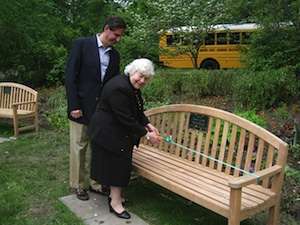 Lucas Meyer and Esther Sloan dedicated a bench in honor of Irving Sloan at Library Pond in 2011.
Lucas Meyer and Esther Sloan dedicated a bench in honor of Irving Sloan at Library Pond in 2011.
Bollywood Dancing at the Scarsdale Library
- Details
- Written by Joanne Wallenstein
- Hits: 1714
 You never know what you’ll learn at Scarsdale Library. On a dreary Saturday last week I found myself following Bollywood dance moves with some very enthusiastic parents and young children, lead by Indian Drag Queen Malai, who’s name translates from Hindi to “cream.” And she was as rich and smooth as cream. Dressed in a wig, a sparkling gown, bangles and a crown she had everyone in the Scott Room rapt with her charms.
You never know what you’ll learn at Scarsdale Library. On a dreary Saturday last week I found myself following Bollywood dance moves with some very enthusiastic parents and young children, lead by Indian Drag Queen Malai, who’s name translates from Hindi to “cream.” And she was as rich and smooth as cream. Dressed in a wig, a sparkling gown, bangles and a crown she had everyone in the Scott Room rapt with her charms.
Malai, who lives in Jackson Heights, where she is known as Queen Malia, was invited to the library as part of a story hour for Scarsdale kids. Before the dancing began, Author Jyoti Rajan Gopal read from her beautifully illustrated book, Desert Queen, a true story about Queen Harish, drag performer from Rajasthan, India. Jyoti explained that she had travelled to Rajasthan with her family where she saw Drag Queen Harish dance and was totally taken with the performance. When she later learned that he had passed away in a car accident, she set out to research his life and wrote Desert Queen as an homage. The book is a 2024 Stonewall Award honoree.
Queen Harish, the books main character, lost his parents as a child and had to take care of himself and his two younger sisters on his own. He discovered that when he dressed as a woman and danced it quieted his worries and his heart was at peace. Jyoti Rajan Gopal displays her books.
Jyoti Rajan Gopal displays her books.
The children listened respectfully to the book and jumped at the chance to dance with Malai, who bright light and a little bit of magic to a rainy weekend in the ‘Dale.


 Jessica Kaplan and Olivia Abramowitz from Bronx River Books were on hand with copies of Desert Queen.
Jessica Kaplan and Olivia Abramowitz from Bronx River Books were on hand with copies of Desert Queen.
Proposed NYS Congressional Maps Look Very Similar to Former Maps
- Details
- Written by Joanne Wallenstein
- Hits: 1574
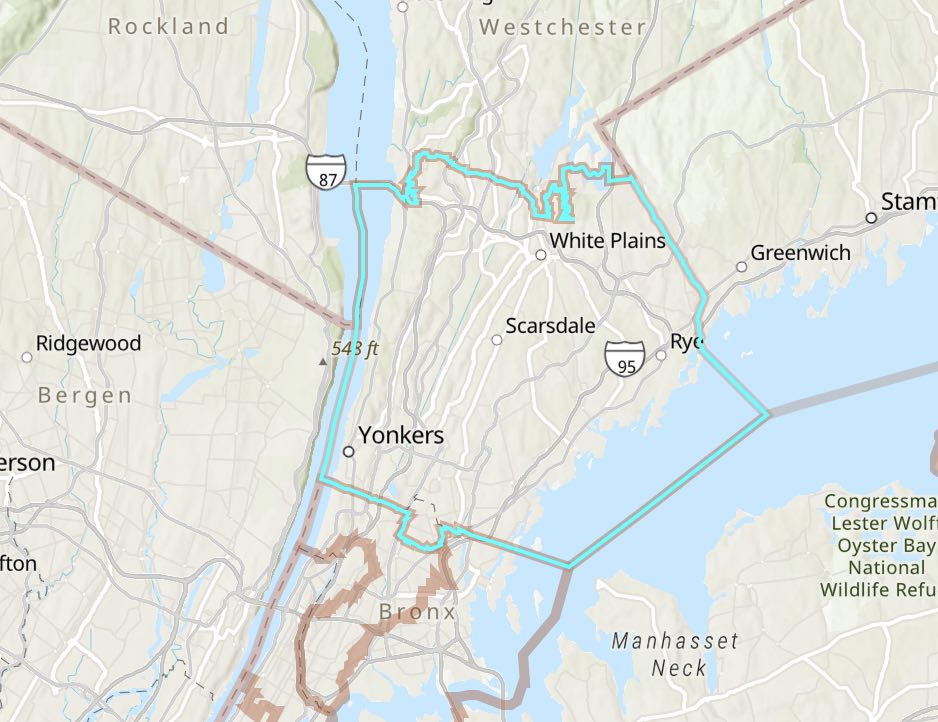 The long awaited redistricting map of New York’s congressional districts was released by the NYS Independent Redistricting Commission this week. The news is that it looks much like the former map that was drawn by a court appointed special master and used for the 2022 election. You can see the new map here. If this new map is passed by the NYS Legislature, Scarsdale will continue to be in Congressional District 16, now represented by Jamaal Bowman. However that seat is currently being challenged by Westchester County Executive George Latimer and many were awaiting the new map to see how it might affect the outcome of the primary challenge.
The long awaited redistricting map of New York’s congressional districts was released by the NYS Independent Redistricting Commission this week. The news is that it looks much like the former map that was drawn by a court appointed special master and used for the 2022 election. You can see the new map here. If this new map is passed by the NYS Legislature, Scarsdale will continue to be in Congressional District 16, now represented by Jamaal Bowman. However that seat is currently being challenged by Westchester County Executive George Latimer and many were awaiting the new map to see how it might affect the outcome of the primary challenge.
Commenting on the new map, Latimer said, “This is only the next step in a long process; it is now in the hands of the legislature, and we are confident in the ability of Majority Leader Stewart-Cousins and Speaker Heastie to complete this process fully and fairly. Regardless of the timing or the ultimate disposition of the lines, we look forward to continuing to bring our message of progressive results that benefit the people of our area, in whatever neighborhood they live and in whatever jurisdictions are ultimately assigned to CD-16.”
Here is an explanation of the recent history of redistricting in New York State:
Redistricting happens every 10 years after each census. The 2020 census triggered many changes in New York due to population changes throughout the state and the loss of one congressional district. After a contentious redistricting process, the NYS Assembly and NYS Senate maps for the 2024 elections have been settled. However, the Congressional map has not been finalized. New York State is critical as we have 26 seats in the House of Representatives and several competitive districts. This is why what happened yesterday is so important.
After the 2020 census, the New York State Independent Redistricting Commission (IRC) was formed to draw a new Congressional map for NYS. The IRC was not able to agree on a single map and submitted 2 competing maps. These maps were then rejected by the Legislature. The IRC had a constitutional duty to submit a new map proposal but did not do so. As a result, the State Legislature drew its own map.
The map passed by the State Legislature was challenged in court and deemed unconstitutional. The Courts determined that because the IRC had not proposed a second map after its first set of maps were rejected, the Legislature did not have the authority to introduce and pass its own map. A court-appointed special master then drew the Congressional map that was used for the 2022 elections. Following those elections, the New York State Court of Appeals ruled in late 2023 that the maps used for those elections were not permanent, and the IRC should send a second Congressional map proposal to the Legislature.
On February 15, the IRC met in Albany and voted to send a new Congressional map to the State Legislature. Unlike two years ago, the Commissioners were able to agree on a single proposal, which passed by a nine to one vote. That map must now be voted on by both houses of the State Legislature and, if approved, be signed into law by the Governor. If the State Legislature rejects the IRC proposal, or if the Governor vetoes the proposal, then the State Legislature may, with certain legal limitations, amend the rejected map and pass its own Congressional map.
For most districts, the Congressional map proposed by the IRC is similar to the existing, special master drawn map. For Westchester’s two Congressional districts (CD-16 and CD-17), the IRC proposal makes no changes within Westchester County. The proposed CD-16 is identical to the existing district, and the only changes to CD-17 are minor adjustments within the Town of Beekman in Dutchess County. Statewide, the most significant changes are to Congressional Districts 18, 19, and 22.
Changing the Paradigm: Let's Seek Innovative Solutions for Stormwater Management in Scarsdale
- Details
- Written by Joanne Wallenstein
- Hits: 1974
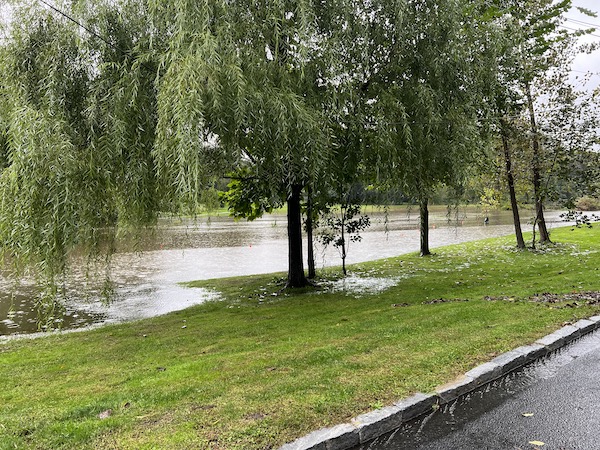 (This is the opinion of Scarsdale10583 site founder Joanne Wallenstein)
(This is the opinion of Scarsdale10583 site founder Joanne Wallenstein)
Sitting in Village Hall for too many nights this month I heard repeated stories from residents about water woes in their homes and streets. Pooling, flooding and wet basements are common. A woman who lives near the library said, “We all have our sump pumps running 24/7. We have to get new pumps every two years as they burn out.” She has asked the Village to inspect the flooded street in front of her house repeatedly to no avail.
Another resident, who lives next to the Crossway firehouse explained that he is downstream from a rollicking waterflow. Every time it rains the catch basin on the Village owned property next to his house overflows onto his driveway. When he calls the Village for help, no one comes. He fears that if more homes are built upstream it will pose a real risk to his property.
A young woman who purchased a new house reports that when it rains she can’t sleep at night. Why? Because she has to be at the ready to put out sandbags to block water from infiltrating her basement.
These reports come from residents at land use board meetings in response to applications to build more homes, driveways and garages in their neighborhoods. The applicants accompanied by their lawyers, architects, landscaping experts and engineers come before the board to seek variances to build in the 25 foot flood plain buffer, or even to build in the FEMA flood plain. This week, the engineer representing the applicants who wanted to build in the FEMA flood plain was asked to explain why he proposed building the driveway in the floodplain – and he shrugged off concerns saying, “It will only accumulate about 6 inches of water in a 25-year storm.”
For that project, the property owners purchased an undeveloped lot in a FEMA flood plain. Were they aware of the building restrictions at the time of purchase? They seemed surprised by the resistance to their plans from the neighbors and the Planning Board. In fact the applicants said, “the Village engineer has been so helpful to us and spent hours trying to come up with a plan.”
Similar praise for help from the Village Engineering Department came from a developer who is attempting to build on an undeveloped wet lot over a watercourse that was formerly a pond in East Heathcote. Apparently the Village helped the applicant design a plan to reroute the watercourse off this property and into the Village right of way. As the lot in question currently serves as a drainage area for both upstream and downstream neighbors they are understandably alarmed by the river coming their way.
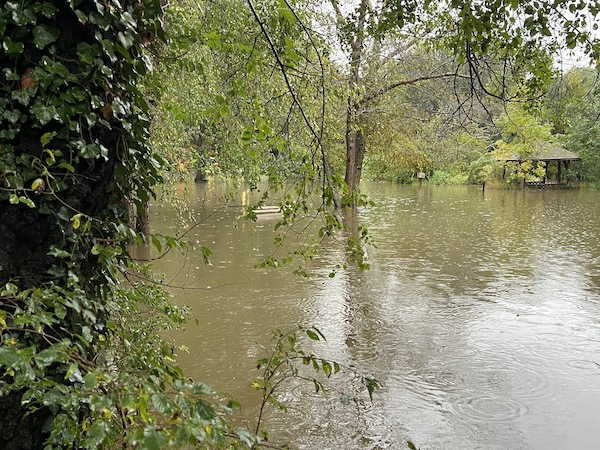
Putting aside the specifics of each project, a few things are now clear:
-Scarsdale has many wet areas, where the water table is too high to build.
-The more we build, the more we flood.
-Our land use boards are spending countless hours reviewing individual applications that usually add more stress to our environment.
Perhaps it’s time to turn this problem around. Instead of battling with builders to prevent the flooding from getting worse, how about seeking pro-active solutions to deal with rising water levels?
Here are a few ideas:
In order to protect the property of current homeowners let’s refocus our energy on designing innovative stormwater management projects that will channel rising water in the right direction.
Let’s empower Village personnel to redirect their energies from assisting builders in getting around Village code to finding solutions for current residents who are suffering the twin problems of rising water and climate change. Ask staff to analyze water issues and maps, research possible solutions, design projects and seek grants for stormwater projects that will improve our infrastructure. Task the Engineering and Public Works Departments with designing projects for the public good, rather than assisting those who are causing more issues. Charge Village staff with coming up with solutions that will shield Scarsdale from the ever more frequent 100-year rainstorms.
Explore public private partnerships to turn private land into Village assets. Rather than create a subdivision that will undoubtedly exacerbate flooding, why not work with property owners to create a watercourse and retention pond with timed release waterflows to alleviate flooding both upstream and downstream.
Wetlands Park
For example on Garden Road, developers have proposed to bring in tons of landfill in order to build an eight home subdivision in a wetlands. Flooded neighbors have retained a law firm to bar this project that they fear will cause even more damage to their homes. Why not look into solutions like the creation of a wetlands park on the site with a retention pond and raised walkways so that residents and wildlife can enjoy the environment and neighbors can be shielded from further water flows? The innovative 7 acre retention pond at George Field is the largest pond in Westchester County. Let's continue the good work.
Open Space
To protect our vanishing open spaces, can the Village buy back open lots and use the space to create culverts, swales and pocket parks to increase permeable surfaces?
How about offering residents tax breaks for leaving open lots undeveloped?
Land Use Boards
Can a body such as the Planning Board help to craft solutions to the problems we are experiencing rather than spending night after night negotiating with those who only seek to exacerbate the issues? Certainly we have skilled and forward thinking volunteers in Scarsdale who could assist in planning forward thinking stormwater management solutions for the public good.
Ad Hoc Committee
We already have a building moratorium in place as a first step in reconsidering our building code, enforcement and the approval and variance process. To move this forward, the Board of Trustees should consider harnessing the expertise of talented residents by forming a task force on stormwater management. They could help to define and analyze the current water problems, investigate best practices around the country and make a strategic plan for addressing a complex issue that will be with us in the years to come.
Let’s take positive steps to control the water, protect existing homes and to create open spaces and recreational areas that are a part of the solution. Just as Scarsdale is a leader in education, we can be at the forefront of environmental management and design model stormwater infrastructure projects.
We all know why people want to live in Scarsdale, but unless we fix what's wrong and develop strong ordinances to protect the environment and deal with climate change the town will no longer be what we've made it.
Lose The Plastic Bag
- Details
- Written by Joan Weissman
- Hits: 1750
 (Submitted by the Scarsdale Conservation Advisory Council)
(Submitted by the Scarsdale Conservation Advisory Council)
Reminder: Don’t Line Recycling Bins with Plastic Bags
Please place commingled recyclables LOOSE in bins.
Plastic bags should not line or be placed in recycling bins. They cannot be recycled with your recyclables and worse yet they get tangled in the recyclingequipment at Westchester's Material Recovery Facility (where our recycling is processed) which damages the equipment and causes the machinery to break and be shut down. By keeping plastic bags out of recycling bins, residents play an important role in making Scarsdale's recycling program a continued success.
What to do with plastic bags?
Scarsdale has established a plastic bag and plastic film recycling program. Residents can recycle these items by bringing them to Scarsdale's Recycling Center (110 Secor Road) which is open Monday-Friday, 8am-3pm. A list of what is considered plastic film can be found here.
For more information on Scarsdale's recycling programs, visit here.














